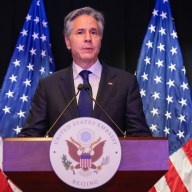Currently, a conference is going on in Bali, Indonesia. It is a global environmental conference that is being held to negotiate a framework for negotiation of a successor to the Kyoto Protocol, which will expire in 2012.
A conference to talk about talking about climate change. Sounds impressive. But at least the countries are there, at least they realize Kyoto will expire and they need to have a plan in place. And the conference started on a promising note with Australia ratifying Kyoto. So, we were thinking, if we were at the conference in Bali (somehow they neglected to invite us, or maybe our invitations got lost in the mail) what would we want to talk about? What are our hopes for this conference?
We hope countries that are refusing to meet their Kyoto goals (Canada), or refused to ratify Kyoto at all (the U.S.) because of the danger of damaging their economies, realize the complete devastation of the global economy could be the result of unchecked climate change, and realize trimming a little here and there now is much wiser.
We hope the participating countries agree to allocate money for the development of sustainable technologies. We believe we can do things in a less energy intensive manner. We just have to commit to changing our established behaviours.
We hope countries also allocate money for adaptation to climate change. There is currently a fund of $35 million under the Kyoto Protocol to help countries hit by climatic disasters, far short of the tens of billions being asked for by attendees of the conference. Countries already affected by climate change tend to be small, poor and coastal.
We hope assistance is offered to developing countries such as India and China, who, with their huge populations and rapidly growing economies, are becoming major carbon emitters as they become industrialized. If assistance is given by the developed world, maybe India, China and other rapidly developing countries can implement sustainable technologies and energy sources as they develop, rather than going back and retrofitting their infrastructures like Europe is doing and North America should be doing.
We hope incentives are given to countries such as Indonesia, the host of the conference, which is starting to consider the consequences of continuing to destroy its rainforest at the current rate.
We hope serious consideration is given to the European idea of imposing a tax on goods from countries that are not attempting to trim their carbon emissions so sustainably-produced goods can compete with unsustainably-produced products.
Will our hopes be met? Will countries put aside their jockeying for position and ever-shifting alliances and power games? Likely not at this conference. But if this conference is successful, the foundation will be laid for future progress.
We will revisit these issues after the conclusion of the Bali conference and see how the world did.
Andrew Laursen is an assistant professor at Ryerson University, studying ecosystem ecology. Sophia Dore is an environmental scientist with Conestoga-Rovers & Associates, an environmental consulting company.
















